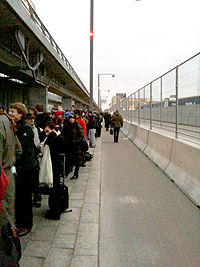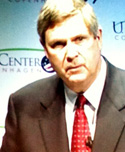Just Transition
By Dick Iannuzzi. Dec. 15, 2009.
NYSUT President Dick Iannuzzi blogged the following for the AFL-CIO on the 15th United Nations Climate Conference in Copenhagen, or COP 15. Iannuzzi is at the U.N. summit as a delegate representing one of NYSUT's national affiliates, the American Federation of Teachers.
 As serious as the term 'just transition' is with respect to climate change, I can't but help think about it in terms of standing outside in the predawn Copenhagen cold for five hours (pictured at right) to transitioning into the warm interior of the Bella Center to register for COP 15. A chance to defrost, and, finally, a chance to be part of the U.N. Climate Conference that so many have been waiting for in the hope that a real commitments might finally be made. While the disorganization and over registration reflects poorly on the conference organizers, the huge crowd and tens of thousands of participants, observers, visitors, media, and press speak highly of the interest in addressing climate change in a way that will be successful.
As serious as the term 'just transition' is with respect to climate change, I can't but help think about it in terms of standing outside in the predawn Copenhagen cold for five hours (pictured at right) to transitioning into the warm interior of the Bella Center to register for COP 15. A chance to defrost, and, finally, a chance to be part of the U.N. Climate Conference that so many have been waiting for in the hope that a real commitments might finally be made. While the disorganization and over registration reflects poorly on the conference organizers, the huge crowd and tens of thousands of participants, observers, visitors, media, and press speak highly of the interest in addressing climate change in a way that will be successful.
The application of "just transition" was evident in labor's approach to every aspect of participation in COP 15. Representatives from a broad range of unions kept focused on the concept. In an attempt to influence the kind of global climate agreement that would meaningfully address global warming, attention must be paid to aggressive investments in energy intensive industries in order to modernize and develop the capacity to be part of the new technologies that will be needed. Just transition speaks to retaining jobs, worker training and education, assistance for workers negatively impacted by climate legislation and agreements, and the support for the research and development needed to address climate change in ways that can enhance the economy.
A meeting of the U.S. labor delegation with Energy Secretary Steven Chu returned over and over to these points. Representatives from UWUA, AFT, USW,CWA, SEIU, LiUNA and others all demonstrated their support for the Obama administration's overall energy/climate plan, while stressing the value their industries are capable of adding to the agenda and, at the same time, stressing the importance of a just transition. Linking this to the perspective of AFT, the secretary was pressed on resources for higher education—especially community colleges—to provide the support to create the well educated and trained (or retrained) employees for new and green technologies. The secretary was reminded that these jobs in education are part of the totality of green jobs.
Day two started with much greater orderliness and a significantly more relaxed mood, but the determination to arrive at something meaningful remained firm. Even the more jovial "artists" inside and outside the great hall delivered somber messages about a failure to deliver meaningful results. A "seasonal" song titled "The Twelve Days Of Denmark" delivered "gifts" that would result from inaction at COP 15.
 U.S. Agriculture Secretary Tom Vilsack addressed delegates on the impact of climate change in rural communities, and especially farmers and in particular dairy farmers. Noting that farmers create half the CO2 they did in the 70's, he outlined new industries that will further reduce carbon emissions going forward. He stressed the direct link between climate change and agriculture, and providing food for a growing population's food supply nationally and internationally.
U.S. Agriculture Secretary Tom Vilsack addressed delegates on the impact of climate change in rural communities, and especially farmers and in particular dairy farmers. Noting that farmers create half the CO2 they did in the 70's, he outlined new industries that will further reduce carbon emissions going forward. He stressed the direct link between climate change and agriculture, and providing food for a growing population's food supply nationally and internationally.
Again, the discussion needs to weigh the impact on local communities (sometimes very poor communities), industries that currently meet farmers needs, and the workers in those industries. From AFT's perspective, it was emphasized that empowering these rural agricultural businesses creates strong local communities to support local public schools. Much education and training will be required, again, if a just transition is to be achieved.
COP 15 is about climate change and how to achieve meaningful agreements. For U.S. labor it means going back home to achieve the necessary legislation. That legislation—if created properly—can be good for the planet, good for its inhabitants, and good for workers provided that there's a just transition.